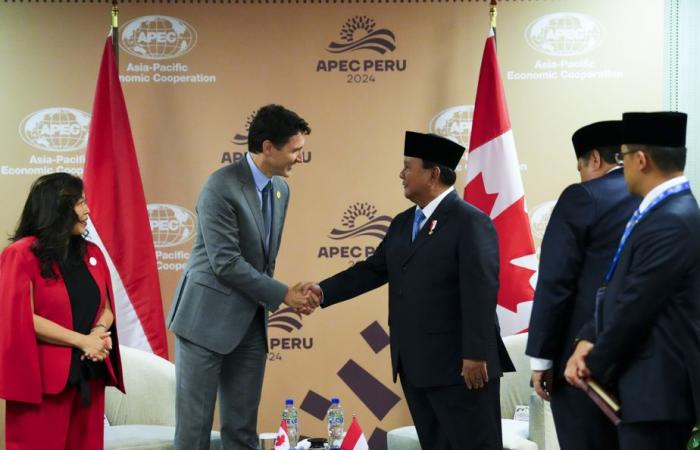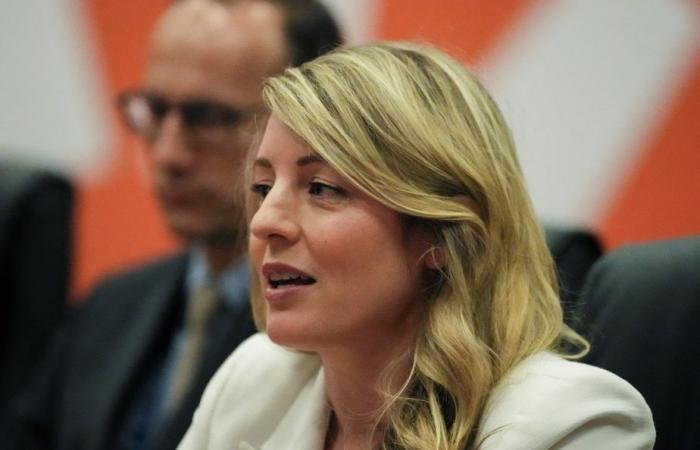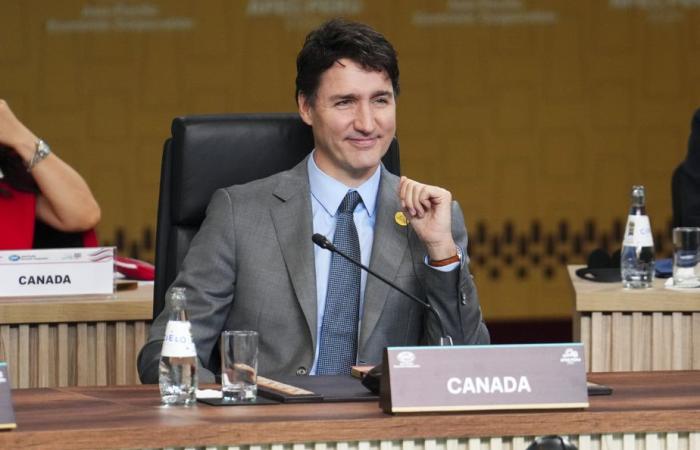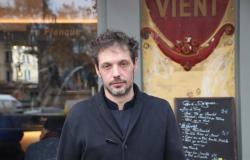(Ottawa) Canada has concluded trade negotiations with Indonesia, paving the way for signing an agreement with the world’s fourth most populous country next year.
Posted at 8:01 a.m.
Updated at 2:40 p.m.
Dylan Robertson
The Canadian Press
Prime Minister Justin Trudeau announced the news alongside Indonesian President Prabowo Subianto during an Asia-Pacific Economic Cooperation, or APEC, summit.
Mr. Trudeau’s office said the two sides must iron out some technical details of the deal, but that it should be signed by next year.
The Prime Minister also announced a new priority on the export of Canadian nuclear energy and cooperation in the Indo-Pacific region.
Mr. Trudeau said the agreement with Indonesia will include goods, services and investments as well as standards for small businesses, labour, environment and gender.
Indonesia has a booming economy, supported by a population of 280 million, many of whom are young people.
The country has sought Canadian help over the past two years to reduce its reliance on fossil fuels as Indonesians struggle with high carbon emissions and threatened biodiversity.
Mr. Subianto said the agreement with Canada would increase trade in the digital and renewable energy sectors.
“We are fortunate to have opportunities,” he said. We have a lot of energy outside of fossil fuels, so we are very confident. »
Mr. Trudeau called Indonesia “the largest economy in Southeast Asia” and a place where Ottawa could collaborate on nuclear technology. Canada plans to send a trade mission to Indonesia next year.
Also Tuesday, Trudeau told business leaders that Canada is looking to partner on nuclear energy in Southeast Asia, particularly as countries in the region worry about large quantities of nuclear energy. energy needed to power artificial intelligence.
Canada’s Indo-Pacific strategy made no direct mention of the nuclear sector when the Liberals released it two years ago.
Going forward, Trudeau says Canada will use its “trade gateway” initiative not only to connect businesses, but also to help expand local knowledge about nuclear technology, such as how to create a viable market for nuclear products. and adequately train staff.
Ottawa “will also identify opportunities for the Canadian nuclear industry as a whole to provide products and services to support Canadian and regional objectives,” Mr. Trudeau’s office wrote in a statement.
His office said this could involve small modular reactors, a new technology that aims to provide low-carbon energy without building large nuclear power plants, including in remote regions.
Canada well placed to understand the United States
Earlier on Tuesday, Foreign Affairs Minister Mélanie Joly said Donald Trump’s return to the White House had strengthened Canada’s influence in the world, as other international partners look to Canada for advice on how to deal with him.
PHOTO ANGELA PONCE, REUTERS
The Minister of Foreign Affairs, Mélanie Joly
Mr. Trump will not be sworn in until January, but his victory in last week’s presidential election looms large in the group’s discussions, which aim to improve trade between the Pacific Rim countries.
Speaking to journalists in Lima on Friday morning, Mrme Joly argued that no country understands the United States better than Canada and that many countries are now seeking advice on how they can adapt to a second Trump administration.
Mr Trump’s first presidency saw him withdraw from numerous multilateral agreements, including the Paris Climate Accord and the Comprehensive and Progressive Agreement for Trans-Pacific Partnership (CPTPP), including half of APEC countries are members.
He also promised to impose an import tax of at least 10% on all goods entering the United States, raising serious concerns among America’s trading partners.
The London School of Economics warned last month that these policies could harm the economies of the United States, China and the European Union.
Mme Joly confirmed that she expects Mr. Trump to visit Canada next year during the G7 leaders’ summit in Kananaskis, Alberta.
“If there is a country in the world that includes the United States, it is Canada,” declared Mr.me Joly. This is why so many delegations, so many countries, come to see us to ask us how we and they can adapt. »
I think Canada’s influence is actually increasing because of the impacts the world is now facing with the new administration.
Mélanie Joly, Minister of Foreign Affairs
Mme Joly met Thursday evening in Lima with US Secretary of State Antony Blinken, whose term will end in January when the new administration is sworn in. Mr. Trump announced this week that he will nominate Florida Senator Marco Rubio as his new secretary of state.
The issue of trade with China
Mme Joly also met with Chinese Foreign Minister Wang Yi on Thursday to discuss cooperation between Canada and China on air transport and the fight against fentanyl. She said she also discussed Canada’s public inquiry into foreign interference with him and sent “clear messages to China that we will never accept any foreign interference.”
“We need to have a predictable relationship,” she argued.
Canadian officials have remained mum on the prospect of a meeting between Mr. Trudeau and Chinese President Xi Jinping, whether in a formal meeting or an informal discussion in the hallway, in Lima at APEC or over the weekend when they both travel to the G20 leaders’ summit in Brazil.
John Kirton, director of the G20 Research Group, expects Mr. Trudeau and many leaders to have informal discussions to consider how to handle a new Trump presidency.
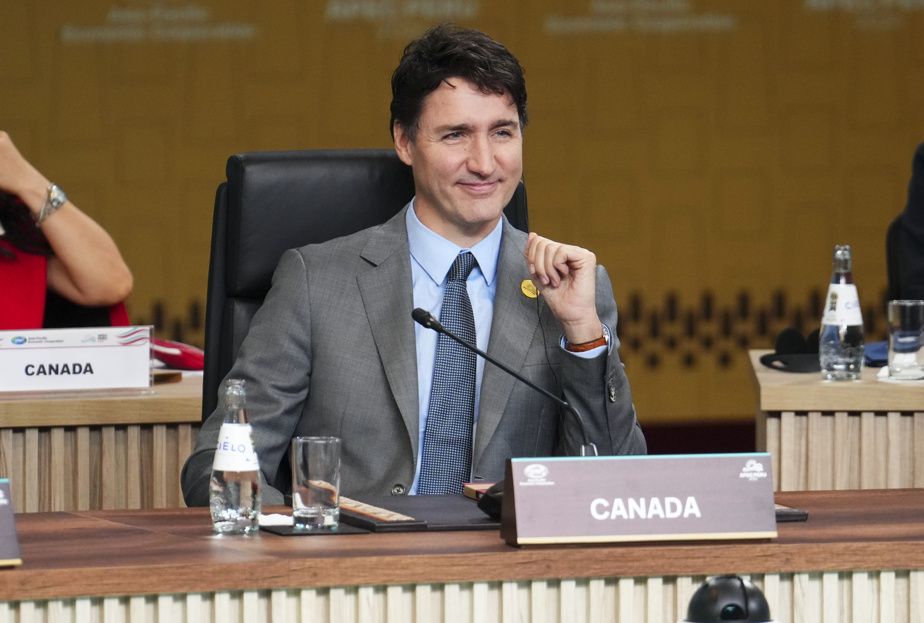
PHOTO SEAN KILPATRICK, THE CANADIAN PRESS
Justin Trudeau, at the APEC summit
“Mr. Trudeau will be in a relatively privileged position, having been alongside Donald Trump during [plusieurs] summits, and we are immediate neighbors; we are a frontline state,” he said.
Vina Nadjibulla, vice president of research for the Asia-Pacific Foundation, said Mr. Trump’s re-election likely means a reduced role for the United States in multilateral institutions and the fight against climate change, as well as greater tension with China over trade, tariffs and technology.
Mr. Trudeau’s Liberals have signaled their intention to continue siding with the United States against China on clean energy and electric vehicles. This fall, Canada matched U.S. tariffs on electric vehicles made in China, increasing tariffs on steel and aluminum products by 100%.
Canada is also considering raising tariffs on electric vehicle batteries and battery parts, critical minerals and solar panels, on which the United States already plans to increase tariffs.
“APEC is meeting against a backdrop of growing protectionism, intense geopolitical competition, uncertain economic growth and the election of Mr. Trump,” explained Ms.me Nadjibulla.
That means Trudeau will push to preserve rules-based trade “that is essential to our prosperity” in the coming days, she said.

